Menu
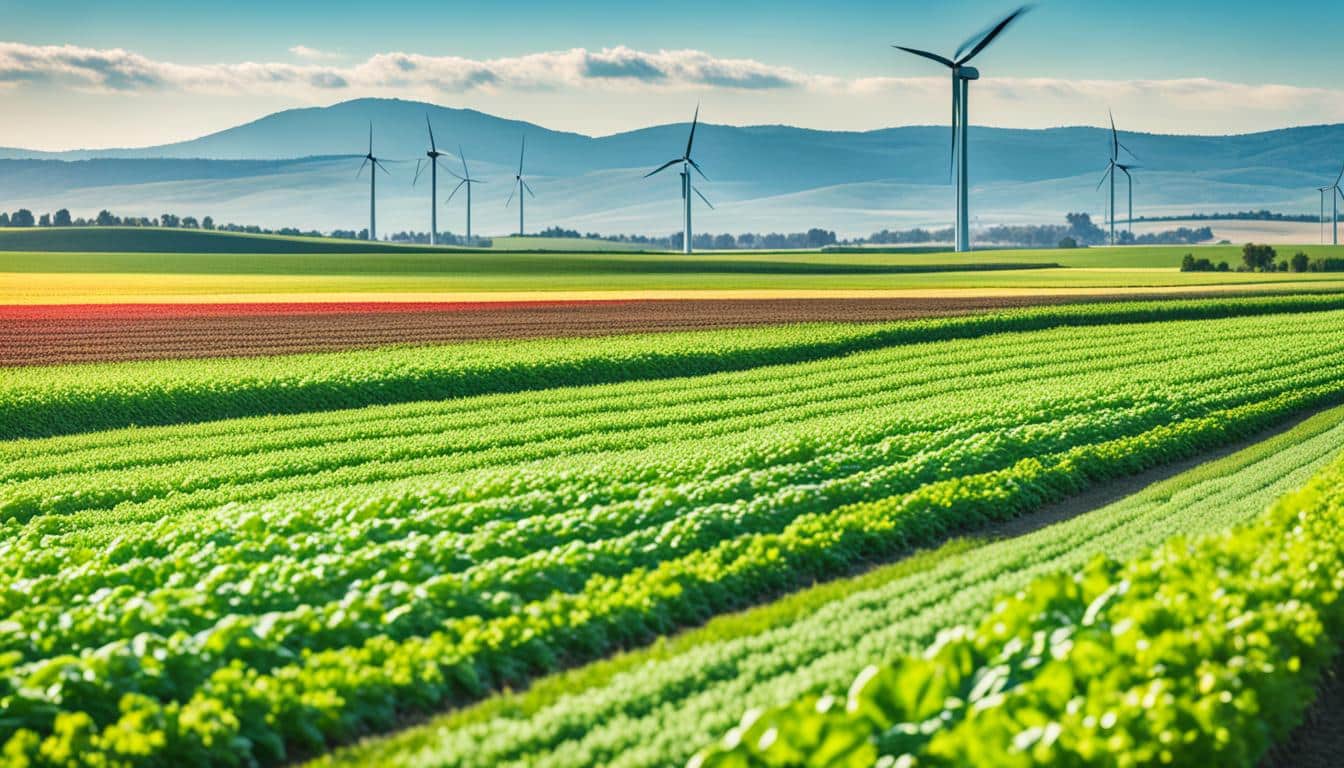
Did you know that traditional animal agriculture in Canada is a big source of greenhouse gas? It’s nearly 15% of the country’s emissions, as much as all transportation. This shows why we need to switch to greener farming in Canada.
Plant-Based Canada and groups like Plant-Based Health Professionals UK are leading a push for plant-focused food systems. They want to make us healthier and help the planet. Traditional farming and modern crop methods harm the environment a lot. They cause climate change, water pollution, and less forests.
But there’s a better way called no-till Conservation Agriculture. It follows three key rules to keep farming sustainable. This method helps us grow more food, save money, and protect the planet. It’s good for dealing with climate change and keeping nature diverse.
Canada is heating up faster than most places, especially in the north. Despite the big impact of animal farming on nature, it doesn’t get much focus in talks about climate policies. This is why it’s so important to support plant-based farming in Canada. It can help our farms support a healthy environment for the future.
In Canada, the move to plant-based agriculture is spurred by a desire for environmental conservation and sustainable agriculture. This shift aims to counter the negative effects of traditional farming on our climate, water supplies, and wildlife. By supporting plant-based agriculture, Canada fights environmental damage and promotes the growth of our ecosystems.
The shift to plant-based agriculture in Canada is both green and shaped by the economy. An investment of over $1.4 million in Big Mountain Foods 2 Ltd. was celebrated. This event, by the Minister of Agriculture, shows the government’s backing for the growing plant-based sector.
Big Mountain Foods 2 Ltd. plans to make more than 2 million Fava Bean Tofu units every year. This will be done with the help of a repayable contribution from the AgriInnovate Program. Their product is soy-free and made from chickpeas grown in Canada. It meets the needs of many consumers and is part of their efforts towards sustainable agriculture. The company’s zero-waste facility in Vancouver, BC, shows their commitment to this movement.
Switching to plant-based agriculture provides key environmental boons. It reduces our carbon footprint and cuts down on water pollution by lessening animal farming. This move also protects wildlife homes and promotes environmental conservation in agriculture. The Canadian Agricultural Partnership has invested $3 billion over five years in this area. It’s aimed at making this sector stronger both at home and abroad.
There’s a growing trend worldwide for plant-based foods. By 2022, the global plant-based protein market is expected to be worth USD 10.8 billion. With a 6.7% Compound Annual Growth Rate, Canada is ready to respond to this trend. In the 2016/17 fiscal year, sales of plant-based protein products in Canada jumped by 7% to more than $1.5 billion. These figures indicate a bright future for Canada’s efforts in plant-based agriculture.
In Canada, many farmers are turning to sustainable methods of agriculture. These methods are earth-friendly. They include things like not tilling the land, which keeps the soil healthier and helps the land use less water.
No-till conservation agriculture is all about disturbing the ground as little as possible. It helps keep the soil covered with plant matter. This is great for making the soil better, helping deal with climate changes, and using less harmful chemicals and fuels.
Over 180 million hectares of land around the world use this approach. And that’s growing fast by 10 million hectares every year. Big supporters of this way of farming, like Professor Amir Kassam, say it helps farming be steadier and stops the land from becoming bad for crops.
Along with not tilling, farmers also use methods like changing what they grow in a field each year and planting certain plants together. This makes farms more diverse and helps the soil stay healthy. It also makes it easier to fight off pests and deal with bad weather.
Canadian plant-based farming relies on three essential ideas for strong ecological systems. These focus on using minimum soil disturbance, keeping a permanent soil cover, and growing different crops. They help the land and nature thrive.
This approach is about being gentle with the ground. It keeps the soil’s structure and health good. Plus, it stops soil from washing away and helps good bugs and plants to live.
It’s crucial to keep the soil covered all the time. This stops it from blowing or washing away. By using techniques like cover crops and mulch, the ground stays healthy.
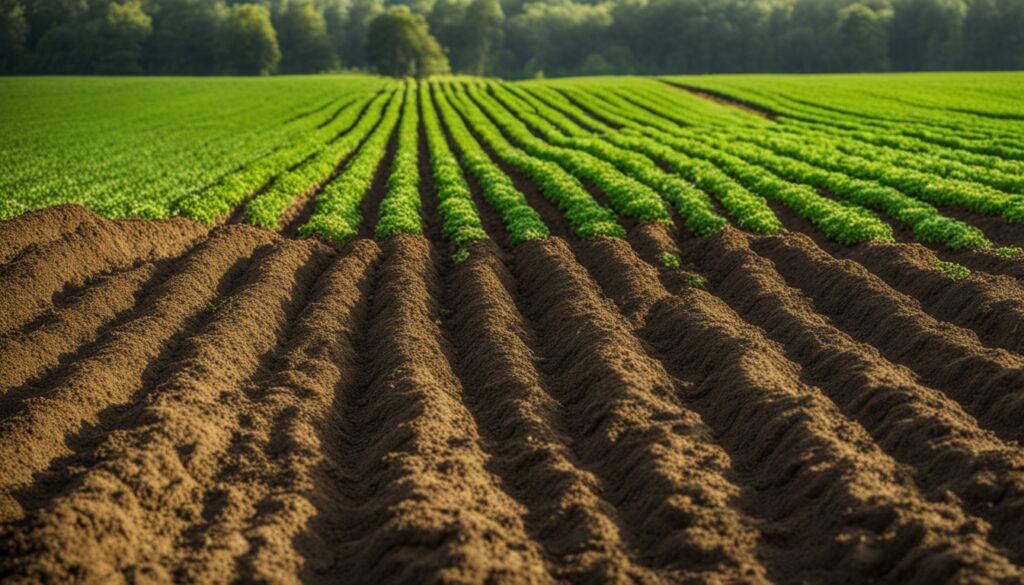
Growing lots of different crops is very smart. It stops pests and diseases and keeps the soil rich. It also makes the farm more alive with a wide range of plants and animals.
These methods fit well with what Canada wants for its farming future. They make the land more fertile, saving it for generations to come. Take a look at how they compare:
| Principle | Benefits | Techniques |
|---|---|---|
| Minimum Soil Disturbance | Preserves soil structure, reduces erosion | Zero-till techniques, reduced tillage |
| Permanent Soil Cover | Protects soil, enhances water infiltration | Cover crops, mulch, organic residues |
| Crop Diversification | Improves soil health, increases biodiversity | Crop rotation, mixed planting |
Canadian plant-based farmers deal with many challenges, especially those linked to the climate in farming. This issue is a big worry for many in the field.
The climate in farming areas of Canada keeps changing, adding stress for farmers. They see hotter, smokier summers that mess with crop cycles. This leads to more wildfire risks, and it’s hard to predict when to plant or harvest.
Soil degradation and erosion are also big concerns. Past farming practices have removed a lot of soil nutrients. This has made it harder to grow crops.
Eldon Kebernik is using methods like green manure to help. But, erosion still takes its toll on crop yield and sustainability.
Accessing the market is tough for these farmers, with it mostly focused on animal products. Plant farmers face an uphill battle for their share. One Degree Organics works with organic producers to get their plant products noticed.
The Canadian government is putting money into plant-based farming to help the planet. They’re giving cash and changing rules to encourage new ideas. This is all to make the food sector better and more competitive.

In a big move, lots of money went towards plant-based farming. For example, Big Mountain Foods 2 Ltd. got over $1.4 million for their special Fava Bean Tofu. This funding helps bring new veg products to the market.
There’s also a $3 billion plan for all agri-food areas in Canada. Plus, the Sustainable CAP aims to spend $3.5 billion over five years on making farming sustainable. Ontario will get a big chunk of this money, up to $569 million, to grow its food business.
Rules from the government are key for making plant-based farming work well. They’ve set up the Resilient Agricultural Landscape Program to improve our land as the weather changes. This gets up to $20 million to help fight climate change.
The government also backs the Dairy Modernization and supports saving energy. These moves push for farming that lasts and cares for the environment. They aim to meet both current and future needs responsibly.
By taking a full-spectrum approach, the Canadian government shows its commitment. They use policy and funds to boost new, earth-friendly ideas. They’re working to make the whole food sector strong, sustainable, and ready for whatever comes.
| Initiative | Details | Funding |
|---|---|---|
| Big Mountain Foods 2 Ltd. Commercialization | Support of allergen-free Fava Bean Tofu | $1.4 million |
| Canadian Agricultural Partnership | General agricultural and agri-food sector support | $3 billion over five years |
| Sustainable CAP | Enhanced sustainability | $3.5 billion |
| Resilient Agricultural Landscape Program (RALP) | Land-based improvements | $20 million |
| Dairy Processing Modernization Initiative | Modernise dairy processing | $8 million |
I’ve seen how Big Mountain Foods stands out by creating plant-based product innovations. Based in Delta, British Columbia, the company has changed the food scene with unique items like Fava Bean Tofu. These products meet many different dietary needs. They aim to be waste-free by 2025 and are safe for people with the top seven allergens. Customers love these foods, as shown by Ann Marie, Svetlana, and Paul who are very happy with their choices.
Big Mountain Foods really focuses on making new plant-based options with care. They offer recipes that suit quick meals as well as longer, special dishes. This means there’s something for everyone’s schedule. Plus, they explain how many people the recipe feeds. Their Fava Bean Tofu, especially, is a hit for being free from many allergens.
The company not only benefits the health-conscious but also the local economy. They use ingredients from nearby, which supports Canadian farms and strengthens local business. This approach also leads to creating many jobs. So, their work helps the economy and society to grow. This is a good example of how to make products sustainably. Their efforts continue to help them grow while caring for the environment.
Vegan farming is reshaping Canada’s agriculture for a greener future. It uses eco-friendly methods to reduce harm to the environment. This shift is vital as Canada works towards cutting greenhouse gas emissions by 2030 and achieving no net emissions by 2050.
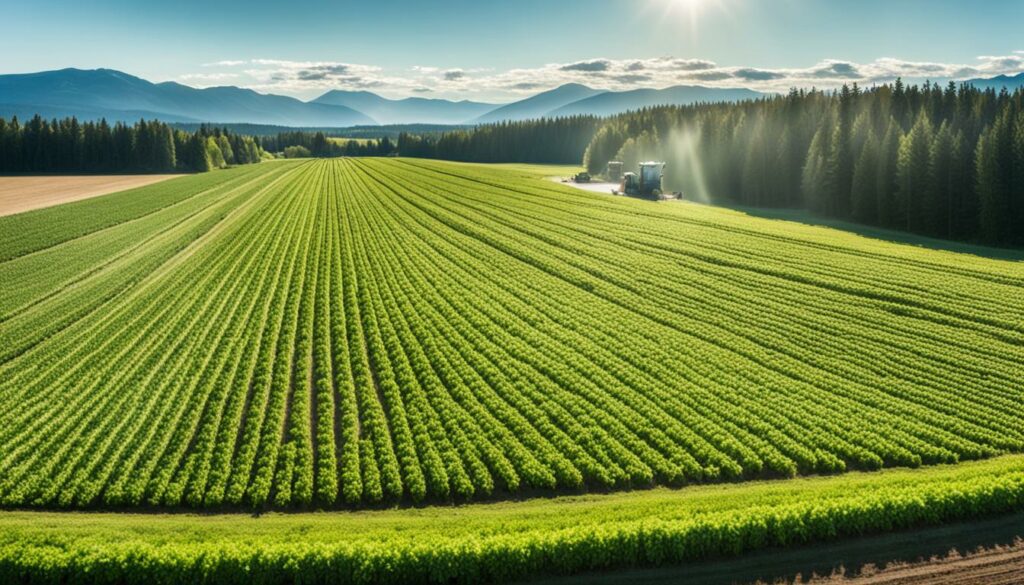
Organic certification is key in vegan farming. It ensures that farms meet strict rules, like no GMOs or synthetic chemicals. This helps keep the soil healthy by using natural methods. It lessens the need for outside help and boosts independence.
In Canada, farms with this certification help lead the way in green farming. They don’t use animal products and aim for a balanced ecosystem. This matters a lot as farm animals globally are big contributors to harmful gases.
Vegan farms in Canada employ earth-friendly techniques. They disturb the soil less, use cover crops, and plant various crops together. These methods lessen harm to the earth. Going plant-based could slash diet-related emissions by 70%.
The Canadian government backs these green ventures with funds, reaching billions per year. Yet, most of this money has boosted the dairy, egg, and chicken sectors. Shifting this support more towards vegan farming aligns with the public’s move towards plant-based eating. Two-thirds of Canadians are into plant-based foods, a 2021 survey shows.
Making plant-based meals the norm can boost people’s choice of them by 60%. This change cuts food emissions by 40% and lowers water use by 24%. It shows how effective green farming methods can be.
Introducing modern agricultural technology to plant-based farming boosts both production and eco-friendliness. Innovations like farm automation and data-driven solutions are key. They help farmers enjoy better outcomes from their hard work.
Automation has changed how we farm. It lets us use robotic systems for tasks like planting and harvesting. This not only makes farming more efficient but also ensures we use our resources better.
Data-driven solutions give farmers smart data insights. With these, farmers can plan out their crops better. They can use the right amount of water and nutrients. This means they can grow food in a more eco-friendly way.
Here’s some important data to understand the impact of these new technologies:
| Statistic | Details |
|---|---|
| Emission Reduction Potential | Canada could decrease agricultural emissions by up to 40% by 2050 through new technologies. |
| Key Ag-Tech Innovations | Seven technologies identified include precision technologies, carbon capture, anaerobic digesters, and more. |
| Funding Challenges | Canada’s share of global agricultural technology investment is considered insufficient. |
| R&D Funding Source | Most agricultural research and development funding in Canada primarily comes from the public sector. |
| Private Investment Lag | Canada has received only 3% of global venture capital and private equity investments in ag-tech since 2017. |
New tech like AI and advanced data crunching can make a big difference in farming. If Canada uses these tools well, it can lead the way in agricultural technology. This not only benefits the economy but also our planet.
Plant-based farming is key to improve the environment in farming. It moves us away from using a lot of animals, which can help reduce greenhouse gas emissions and protect biodiversity. By shifting focus, we make our ecosystems stronger and more alive.
Livestock farming is a big source of greenhouse gases, with Australia blaming 70% of theirs on it. On the other hand, making plant-based foods like some margarines hurts the environment less. If we eat more plants, we can cut a huge amount of emissions. For example, going without meat one day a week equals the impact of driving 1,860 kilometres less each year.
Growing one kilogram of beef needs about 15,000 litres of water. Plant production, however, uses much less water. So, choosing plant-based foods is better for our air and water. Plus, it uses up our natural resources more wisely.
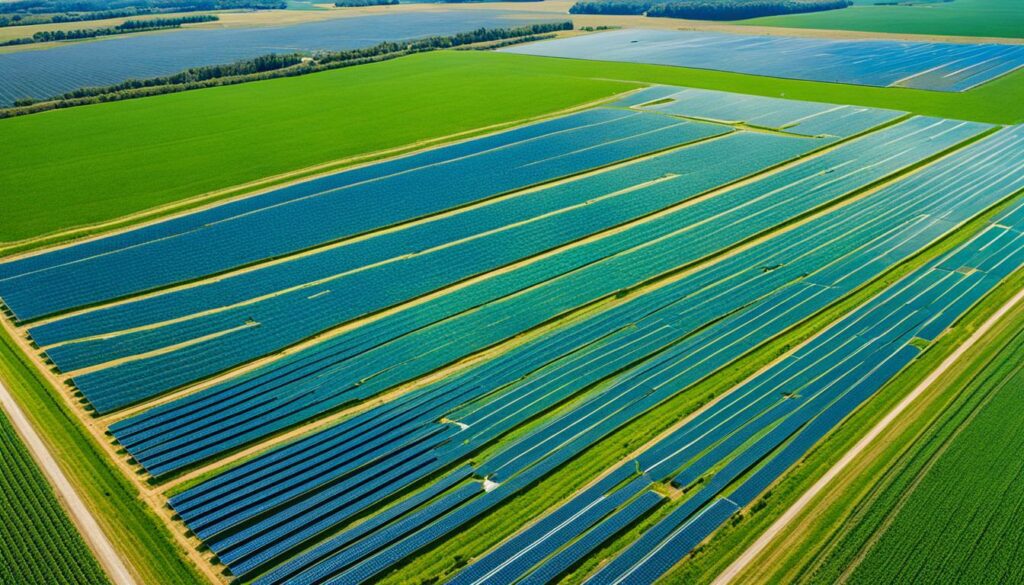
Conserving the environment in farming helps keep nature diverse. A variety of plants and animals is crucial for environmental health. In Canada, using legume crops on the land a lot has many good effects. Legumes, like peas, help keep the soil healthy without needing as many chemicals.
Some places, like Portugal, are making it a rule to offer mainly plant meals in public places. This helps keep the homes of wild animals safe. It also helps keep the environment balanced. Plant farming is not only good for the environment but also for our health. Studies have connected more plant eating with healthier guts, less bad cholesterol, and better heart health.
| Factor | Animal-Based Farming | Plant-Based Farming |
|---|---|---|
| Water Usage (litres per kg) | 15,000 | Significantly Less |
| Greenhouse Gas Emissions | High | Low |
| Biodiversity Impact | Negative | Positive |
| Soil Health | Degradation | Improvement |
I strongly back environmental conservation in agriculture. Switching to more plant farming is necessary. It cuts down on harmful emissions and boosts biodiversity. This leads to a better future for us and the next generations.
Organic farming is growing in Canada as a key part of agriculture. It brings many benefits, such as helping the environment and creating healthy food. But, it also faces challenges. Understanding both sides helps us support this sustainable way of farming.
The benefits of organic farming are clear. It strictly avoids chemicals and GMOs, making food safer and better for the planet. Methods like rotating crops and planting together help the soil and nature thrive.
It’s also about creating healthy soil without animal by-products. This method, called veganic farming, is part of regenerative agriculture. It focuses on soil health and biodiversity, all without strict rules.
Organic farming does face hurdles, like getting big enough to reach everyone. Infrastructural issues and a lack of awareness can hold back its growth against traditional farms.
But, solutions to these problems exist. Using new technology and supporting policies are keys. Helping farmers with funding and regulations can push the organic sector forward.
Here is a comparison of organic farming and regenerative agriculture:
| Aspect | Organic Farming | Regenerative Agriculture |
|---|---|---|
| Regulatory Requirements | Strict legal frameworks, prohibits synthetic chemicals and GMOs | No official definition, leading to potential greenwashing |
| Soil Health Focus | Emphasises building healthy soil naturally | Focuses on restoring soil health |
| Common Practices | Crop rotation, companion planting | Zero-till practices, cover crops, composting |
| Use of Animal By-products | Avoided in plant-based organic farming | Not specified |
Overcoming the challenges in organic agriculture and using sustainable organic solutions can lead to a greener future. Organic farming can keep moving towards being friendlier to our planet.
Plant-based farming in Canada thrives on local sourcing and careful crop picking. These strategies match the farming world with ideals of keeping the earth healthy. They also make sure the way we grow our food is good for the planet.
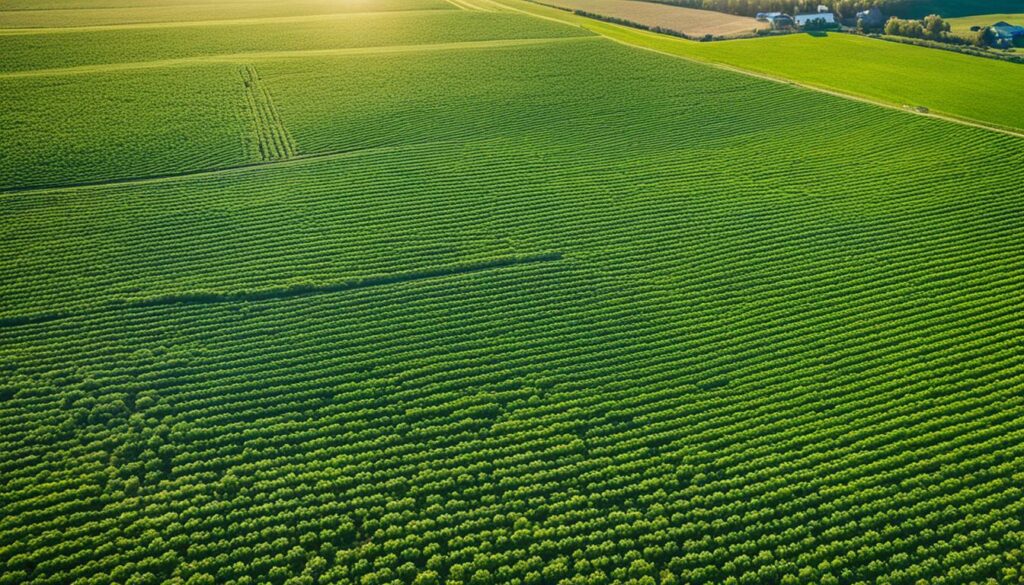
Grains and pulses from Canada are very important for plant-based farming. They’re not just nutritious. They also cut down on transport needs, lowering pollution. With smart planning and new ideas, Canada can lead in plant-based foods, aiming for $20 billion a year.
Choosing crops that grow well locally and sustainably helps both the earth and the farmers. These crops are tough against the area’s weather and need less done to them. This kind of farming also keeps the land rich, helps save wildlife, and cuts down on harmful gases.
Combining local sourcing with choosing the right crops is key. It meets people’s wish for more plant foods. Plus, it fits with Canada’s big plans for being green and growing the food market.
In Canada, people are moving towards diets focused on plants. This is mainly because they are becoming more aware of the benefits for their health and the planet. Media has played a big role in this, showing how farming impacts our health and the environment. Due to this, there has been a jump in people wanting plant-based foods. The market for these foods is growing, with a yearly increase of 9.22% expected between 2022 and 2027.
From 2019 to 2022, the trend towards plant-based diets saw a strong growth. The Covid-19 crisis also played a big part, causing a disruption in the supply of meat. This made many people try plant-based alternatives. Products like coconut and almond milk and plant-based meats have become very popular. It shows that people are choosing healthier and greener options.
The media has had a huge impact on how people view farming and what they eat. Documentaries, social media, and news have highlighted the benefits of choosing plant-based. This media push has led people to demand more plant-based options. It has also motivated big names like Nestle, Impossible Foods, and Beyond Meat to get creative and offer more choices.
The move towards eating more plant-based is likely to keep growing. More Canadians are thinking about how their food choices affect their health and the earth. With ongoing media coverage, the future looks bright for plant-based foods. Major players in the industry are also investing and coming up with new ideas.
| Year | Market Growth (%) | Key Drivers |
|---|---|---|
| 2019-2022 | 8.5% | Health Consciousness, Environmental Awareness |
| 2023 | Projected 9.22% | Post Covid-19 Supply Chain Shifts, Media Influence |
| 2024-2029 | Projected 10.5% | Continuous Innovation, Strategic Investments |
Plant-based farming in Canada has brought big benefits. It helps local areas and the whole country grow. By focusing on plants, farming brings more jobs and grows markets.
Plant-based farming makes a lot of jobs. The Protein Industries Canada (PIC) group plans to create $853 million in new business. This will boost Canada’s GDP by $15 billion and could create 50,000 jobs. Also, it’s expected to make over 4,500 more jobs in ten years.
New technologies like drones and smart farming bring more job chances. Plant-based farming requires these new skills. It means more people can find work in areas like drone piloting and making farms smarter.
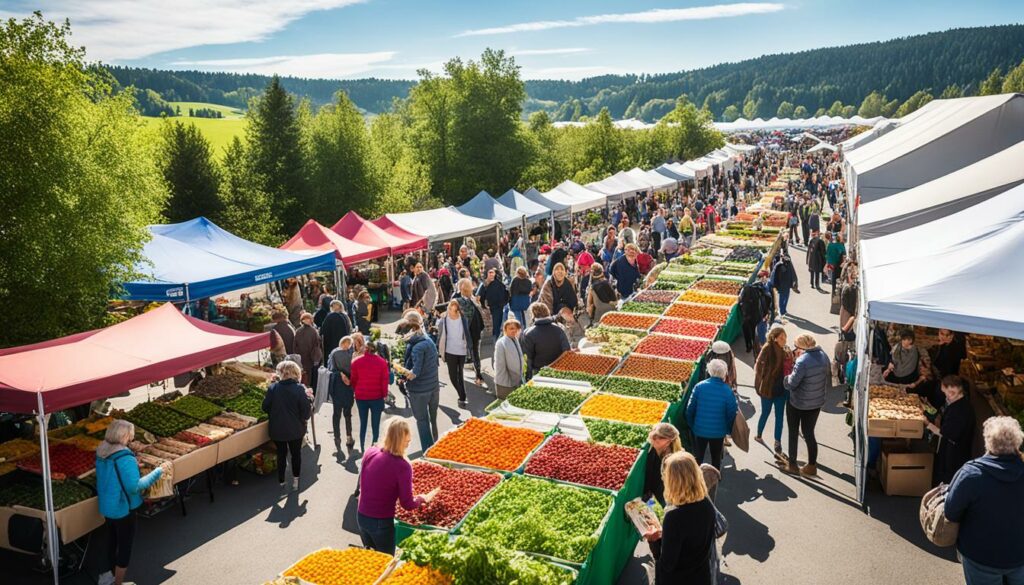
The market for plant-based foods is growing fast. By 2022, global sales of these foods could hit $10.8 billion. Sales of plant-based proteins in Canada jumped by 7% to reach $1.5 billion in one year.
Plant-based dairy sales could be worth $34 billion globally by 2024. And the market for plant-based drinks has grown by 33% each year for the last five years. This high demand offers new chances for Canadian businesses. It also means more jobs and growth in exports.
| Economic Factor | Data |
|---|---|
| Plant-Based Protein Market Growth | USD 10.8 billion by 2022 with a CAGR of 6.7% |
| Canadian Plant-Based Protein Sales | $1.5 billion in 2016/17 fiscal year |
| Global Revenue for Plant-Based Dairy | USD 34 billion by 2024 |
| Annual Growth Rate of Plant-Based Beverage Market | Approximately 33% over the past five years |
| Job Creation through PIC Consortium | Creation of up to 50,000 new jobs |
| GDP Addition by Protein Industries Innovation Cluster | Over $4.5 billion |
The growth of plant-based farming boosts the economy in different ways. It creates more jobs and expands the market for plant foods. This shows how Canada can shine in the global plant-based farming scene.
The plant-based agriculture future in Canada looks very bright. Recent investments and new policies show its importance in sustainable farming. For example, Big Mountain Foods 2 Ltd. got over $1.4 million for its work in Delta, British Columbia. This money from the AgriInnovate Program helps make new farming products. It shows Canada’s aim to boost farming innovations.
Canada is aiming to be a leader in eco-friendly farming through things like the Canadian Agricultural Partnership. With $3 billion put in over five years, it’s a big deal. Big Mountain Foods 2 Ltd. have made a cool Fava Bean Tofu that’s good for people who have allergies. It can make more than two million units every year.
Big Mountain Foods 2 Ltd.’s new place in Vancouver focuses on being green. It aims to not waste anything. With places like Whole Foods wanting their stuff, the market looks good. Plant-based diets can help save the planet by cutting emissions a lot. The government is giving them a hand, too, by working on better ways to grow crops. This push makes Canada a key player in farming that thinks about the future.
The push for plant-based farming in Canada comes from a worldwide effort to stop harm to the environment. It aims to boost the ecosystem. This approach is focused on making farming sustainable and protecting the planet. It tackles problems like too much greenhouse gas and cutting down trees for traditional farming.
Plant-based farming helps the planet in several ways. It reduces the greenhouse gases that cause climate change. It also supports the health of the soil and a variety of plants and animals. This leads to better and lasting farming practices.
No-till Conservation Agriculture is a green farming method. It keeps the soil mostly undisturbed and always covered. It involves growing different plants, which makes the farm stronger against the weather. This method needs less use of chemicals and fuels.
Rotating crops and planting friends helps keep the soil happy. It also keeps the bugs and diseases away and boosts how much food the farm makes. These ways are key to keeping agriculture strong and nature-friendly in Canada.
The main ideas behind plant-based farming are simple but powerful. You should not plough the land much, keep it covered, and grow many different things. Doing this keeps the land in good shape, adds life to it, and cuts down harm to the environment.
Plant-based farmers in Canada have a hard time with the weather, the land wearing out quickly, and finding enough buyers. These challenges make it tough to keep farming sustainably. This affects how well they can grow food and look after the land.
The Canadian government is helping plant-based farming with money and rules. They gave £1.4 million to Big Mountain Foods 2 Ltd. to grow their business. They also have plans to make the plant-based farming business strong and healthy.
Big Mountain Foods makes new foods like tofu without soy and tofu from fava beans. These foods meet special diets and use up little. They also help folks find jobs and use ingredients close by, boosting the local area.
Vegan farming in Canada means using nature-friendly ways without animal parts. It also means farming how nature does it to keep the soil rich, not using GMOs, and being light on the earth. This way is kind to the planet.
Technology is big in plant-based farming, making things like automatic farm work and smart plans possible. These new tools help farmers work better, know more about their crops, and do their job in a way that is good for nature.
Choosing plant-based farming over lots of animals cuts down on bad gases and saves wildlife. This way of farming helps nature thrive and makes Canada’s land more varied and rich in life.
Organic farming is good for the earth and makes healthy food. But it’s hard to get a lot of food this way and tell people about it. Making and sharing new ways to farm and helping out the farmers can help.
Getting food from close by and picking the right crops is good for health and the earth. Canada does well in growing certain grains and peas. This supports making more plant foods in a way that does not harm nature.
More people want plant foods, which changes what’s sold. Stories in the media have taught people about the harm of eating lots of meat. This has led more people to choose plant-based foods.
Plant-based farming brings in jobs and help local money flow. Big Mountain Foods and others have made new markets and products. They have helped grow Canada’s farming in a way that helps everyone.
The future for plant-based farming in Canada looks bright, with signs pointing to growth and new ideas. Better technology and support from the government are driving this. They aim to make farming greener and more successful in the future.